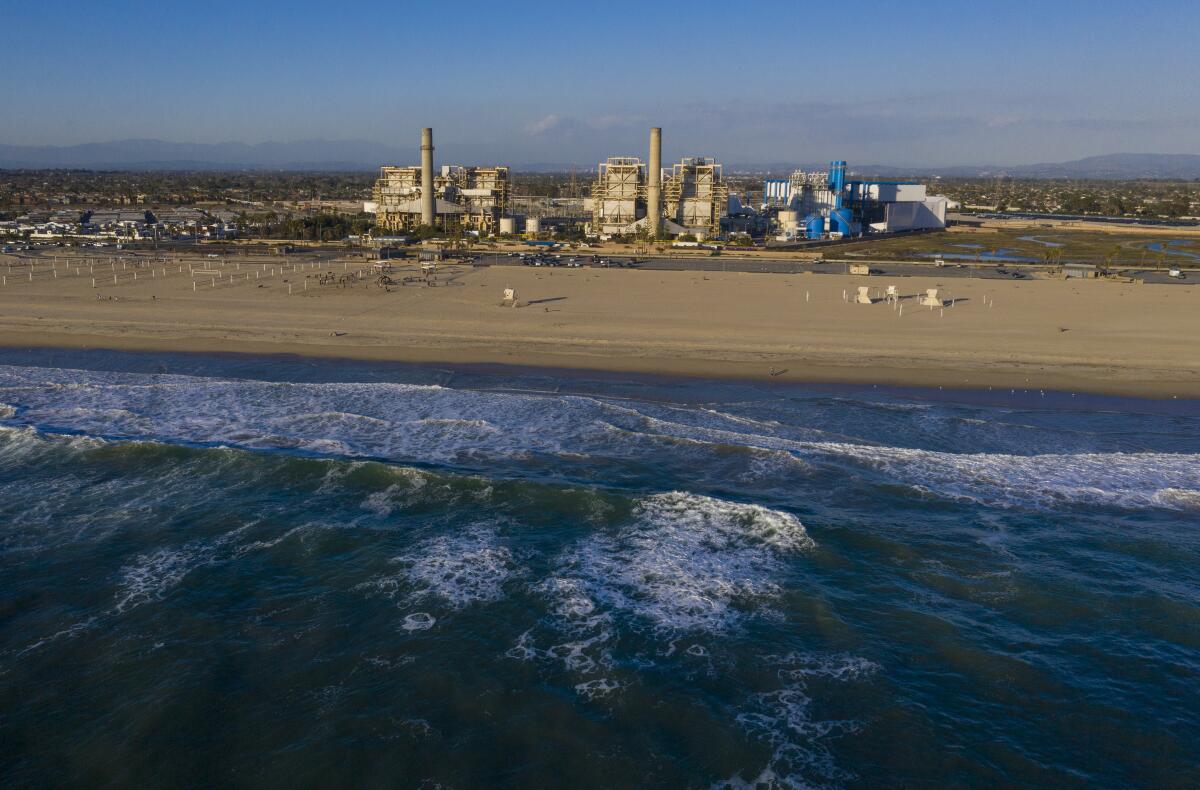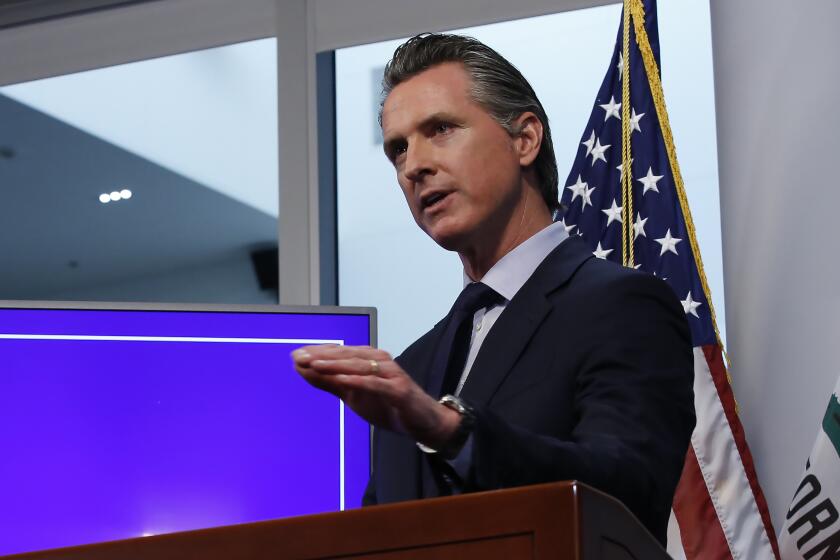Newsom pushes private seawater desalting plant over local and environmental opposition

When Gov. Gavin Newsom was photographed dining at an opulent Napa Valley restaurant during a surge in coronavirus cases, many Californians saw it as hypocrisy. For opponents of a planned $1-billion desalination plant along the Orange County coast, however, the optics were menacing.
The unmasked Newsom was celebrating the birthday of a lobbyist for Poseidon Water, which is close to obtaining final government approval for one of the country’s biggest seawater desalination plants.
Poseidon boasts that the facility will provide a local, inexhaustible source of water for Southern California. Critics complain that Newsom and his political appointees are exerting heavy influence to benefit a private company that would produce some of the state’s most expensive supplies.
Emails obtained by The Times and the environmental group California Coastkeeper Alliance through the state Public Records Act indicate that top California Environmental Protection Agency officials have been involved in a water board’s review of the complex proposal. In addition, Newsom took the unusual step of replacing a Santa Ana Regional Water Quality Control Board member who was highly critical of the project.
Though the Huntington Beach facility meets the state goal of diversifying California’s water supply, it would undermine other environmental policies. The plant would require large amounts of electricity; it would sit next to a rising sea; and it would continue the use of huge ocean intakes harmful to microscopic marine life.
“The Governor has spoken many times about the importance of … ensuring the sustainability of California’s water supplies,” Newsom’s office said in a statement. “Regions across California must continue to innovate on local projects as climate change makes our state’s water supply more unpredictable.”
Two people familiar with the approval process say staff at the water board, which would need to issue a permit for Poseidon’s ocean intake and discharge operations before the company can go to the California Coastal Commission for final approval, have been under intense pressure to advance the proposal.
Poseidon Water hopes to help quench Orange County’s thirst, but first the company’s proposed desalination project must slake a thirst of its own.
During three days of online hearings in July and August, board members questioned whether there was a need for the water supplies Poseidon would provide, noting that the company has yet to lock in a firm buyer for the 50 million gallons a day the plant would produce.
The toughest questions came from William Von Blasingame, a retired power company executive whose second term on the board was about to expire.
With the board’s decision still pending, Newsom’s office announced on Oct. 21 that the governor would replace Von Blasingame with Letitia Clark, a Tustin City Council member who received campaign contributions from pro-Poseidon labor groups during her 2020 reelection campaign.
“Once again I think the governor stepped in,” said Karl Seckel, an Orange County water official. “It seemed rather transparent that he didn’t want Von Blasingame involved in that decision.”
In an interview with The Times, Von Blasingame said he was surprised that Newsom didn’t keep him.
“To change someone in the final days of deliberation seemed to be highly unusual,” he said.
Newsom’s office said the governor “carefully reviews all appointments and has made many changes across his administration over the past two years to bring in new members to provide fresh perspective.” Newsom is confident Clark “will represent her community’s interests in decision-making on the board,” the statement continued.
While the project hearing was underway last summer, according to records, Cal EPA Secretary Jared Blumenfeld also called and texted three other board members, contacts that Poseidon opponents say violated state law.
The communications, which Blumenfeld defends as proper, were disclosed recently by the board.
In the texts and phone calls to board members Kris Murray, Joseph Kerr and Lana Ong Peterson, Blumenfeld did not tell them how to vote. But according to the disclosures — in which the three recount ex parte communications with Blumenfeld outside of formal proceedings — he stressed that the board had a very important decision to make.
He asked when the board would vote, wondered how the meeting — which was livestreamed — was going and mentioned the administration’s just released Water Resilience Portfolio.
In a statement, Cal EPA said it was the job of Blumenfeld and Deputy Secretary Kristin Peer “to be in regular contact and coordination with Regional Water Board staff and members on a variety of matters. Secretary Blumenfeld reached out to three members of the Santa Ana Board to offer his office’s assistance and it was subsequently determined, out of an abundance of caution, that these conversations would benefit from being placed into the public record.”
The resilience portfolio was one of the topics on which Poseidon has lobbied the administration and governor’s office.
During the last two years, the company paid lobbying firms a total of $839,000 to represent its interests in Sacramento, according to secretary of state records.
The bulk of that sum, $575,000, went to Axiom Advisors, the firm headed by longtime Newsom friend Jason Kinney, whose French Laundry birthday dinner Newsom attended.
The party exposed something that has long been the subject of quiet discussion in Sacramento: Gov. Gavin Newsom’s decision to maintain a tight relationship with Jason Kinney, director of a lobbying firm with business before the governor.
Poseidon’s pursuit of state approvals hasn’t been confined to lobbying. Email exchanges by the regional board staff show that company Vice President Scott Maloni has repeatedly inserted himself into staff business.
In one email, Maloni offered “some suggestions that might help staff in responding to potential Board member questions that could arise” at a March 2020 meeting.
In another, he asked board executive officer Hope Smythe to include a specific slide in its March presentation that might “proactively alleviate any Boardmember questions or concerns” about the need for the Poseidon supplies.
When the March meeting was canceled because of COVID-19, Maloni demanded “to know staff’s plans to course correct and the resulting schedule.”
An April email exchange between two state water board scientists who were working on the desalination project also mentions a “poseidon meeting at the Governor’s office.”
The email records include numerous scheduling messages for calls and online meetings involving board staff and Peer, a Newsom appointee who is Cal EPA’s special counsel for water policy.
Peer scheduled one “check-in” online meeting for Aug. 6, the eve of the third day of the Poseidon hearing at which it had been expected the board would vote. Along with Smythe and two state water board officials, Peer invited Maloni and Poseidon Senior Vice President Peter MacLaggan.
After another round of discussions on Aug. 7, board members decided to continue the hearing because they had lingering questions about aspects of the project, including the adequacy of Poseidon’s plans to mitigate the ecological harm of its ocean intake with environmental restoration work.
After a September date was scheduled and then canceled, Smythe proposed continuing the hearing on Oct. 15.
Maloni, who earlier in the year had chafed under COVID-related delays, replied that the company needed more time to digest new mitigation information. “We don’t think a mid-October hearing is achievable,” he wrote. It didn’t occur.
In early November, records show that Blumenfeld scheduled a “check-in on Poseidon” conference call with Peer, Maloni and a state board attorney.
Board members are expected to return to the Poseidon project in April, when they will consider changes in the proposed permit, including additional environmental mitigation requirements.
One thing that hasn’t changed is a condition that the company obtain all necessary approvals for the environmental work before it can operate the desalter.
Poseidon argues that the provision will stretch out the project timeline and hinder financing. The company proposed alternative language dropping the condition, which the staff included in the permit package for the board’s consideration.
In a statement, Maloni said the amended permit increases the number of coastal habitat projects from three to five and the restored habitat from 21 acres to 84 acres. He added that the hearing needed to be postponed last fall because Poseidon lacked specific details of the new mitigation requirements.
“We are proud of the transparent and inclusive process and look forward to the Regional Board’s adoption of the permit,” Maloni said.
To project opponents, the regional board emails paint a clear picture.
“Faced with an uphill battle to get the necessary votes, Poseidon … asked for the October adoption hearing to be postponed so that the governor had time to remove member Von Blasingame from the decision-making process,” contended Sean Bothwell, executive director of the California Coastkeeper Alliance.
“With a more favorable board, Poseidon is now lobbying hard for a ‘get out of jail free’ card that will allow the project to begin operating before all the necessary permits are obtained to mitigate the significant pollution and marine life impacts it will create.”








